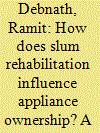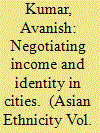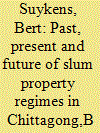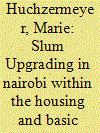|
|
|
Sort Order |
|
|
|
Items / Page
|
|
|
|
|
|
|
| Srl | Item |
| 1 |
ID:
086813


|
|
|
|
|
| Publication |
2009.
|
| Summary/Abstract |
Before the violence came, Margaret Atieno Okoth sold cabbage six days a week at a cramped stall in Nairobi's Toi market, alongside vendors selling everything from second-hand shoes to bicycle parts.
|
|
|
|
|
|
|
|
|
|
|
|
|
|
|
|
| 2 |
ID:
166968


|
|
|
|
|
| Summary/Abstract |
This study explores the effect of slum rehabilitation on appliance ownership and its implications on residential electricity demand. The low-income scenario makes it unique because the entire proposition is based on the importance of non-income drivers of appliance ownership that includes effects of changing the built environment (BE), household practices (HP) and appliances characteristics (AC). This study demonstrates quantitatively that non-income factors around energy practices influence appliance ownership, and therefore electricity consumption. The methodology consists of questionnaire design across the dimension of BE, HP and AC based on social practice theory, surveying of 1224 households and empirical analysis using covariance-based structural equation modelling. Results show that higher appliance ownership in the slum rehabilitation housing is due to change in household practice, built environment and affordability criteria of the appliances. Change in HP shifts necessary activities like cooking, washing and cleaning from outdoor to indoor spaces that positively and significantly influences higher appliance ownership. Poor BE conditions about indoor air quality, thermal comfort and hygiene; and product cost, discounts and ease of use of the appliances also triggers higher appliance ownership. The findings of this study can aid in designing better regulatory and energy efficiency policies for low-income settlements.
|
|
|
|
|
|
|
|
|
|
|
|
|
|
|
|
| 3 |
ID:
165136


|
|
|
|
|
| Summary/Abstract |
Ethnic communities constantly fear of being stripped of their cultural identities, which intern their preference of shying away from settling in slums. The difficulty arises from the highly contingent conceptualization of ‘slum’, as an agglomerate of poor seeking income. The paper investigates paradox of identity embedded in insecurities among ethnic migrants who lack recognition by the state and society. Data was collected using observation, in-depth interviews, and focus group discussions. Constant comparative method (CCM) together with thematic sampling was used for data analysis. The finding suggests that alienation of ethnic migrants is a consequence of constant negotiation of their identity in response to ‘self-society-State’. It recommends slum to retain independent social space for ethnic community and society in a composite culture. To overcome the challenges of identity, income, and insecurity among ethnic migrants, the paper proposes a convergence model to integrate co-existence of multiple identities for public entitlements, welfare, and social acceptance.
|
|
|
|
|
|
|
|
|
|
|
|
|
|
|
|
| 4 |
ID:
153019


|
|
|
|
|
| Summary/Abstract |
This article argues for the need to take time into account when understanding land ownership in slums. It shows that this allows comprehending more accurately the place of land law and the specific forms that legal struggles over land take. Field research in a slum in Chittagong (in Bangladesh) reveals that while contemporary practices of ownership and transfer might appear to be informal and illegal, they are not only grounded in historical forms of legal land settlement, embedded in a long-standing court battle over legal ownership, but also the product of expectations related to the (legalised) future. Finally, urban planning, with a state-sponsored vision of the future of slums, further complicates the role of the law.
|
|
|
|
|
|
|
|
|
|
|
|
|
|
|
|
| 5 |
ID:
081715


|
|
|
|
|
| Publication |
2008.
|
| Summary/Abstract |
Shackdweller communities are among the most impoverished and exploited on the planet. With nearly 1 billion people living in them, one might consider them to be hotbeds of radicalism. Yet, in fact, very few settlements have become disobedient. Using the work of S'bu Zikode of the Abahlali baseMjondolo Shackdwellers Movement (South Africa) and the work of Alain Badiou, I show how politics is lived in Durban's shacks, and show how Badiou's thoughts supplement a series of uniquely African instances of politics
|
|
|
|
|
|
|
|
|
|
|
|
|
|
|
|
| 6 |
ID:
081712


|
|
|
|
|
| Publication |
2008.
|
| Summary/Abstract |
This article addresses the high level of commercialization of shelter and basic services in Nairobi, and its implication for slum upgrading in Kenya. The article is based on a review of published and grey literature, and on qualitative interviews with slum residents as well as with landlords, tenants and stakeholders in Nairobi's multi-storey tenements. The Kenyan government's conceptualization of slum upgrading inserts benefits into a highly distorted market, preventing a balanced realization of the internationally recognized elements of the right to housing, and raising fears of displacement among slum residents. An analysis of the wider tenement market confirms these fears, and suggests that market distortions must be addressed in order for slum upgrading to succeed
|
|
|
|
|
|
|
|
|
|
|
|
|
|
|
|
|
|
|
|
|